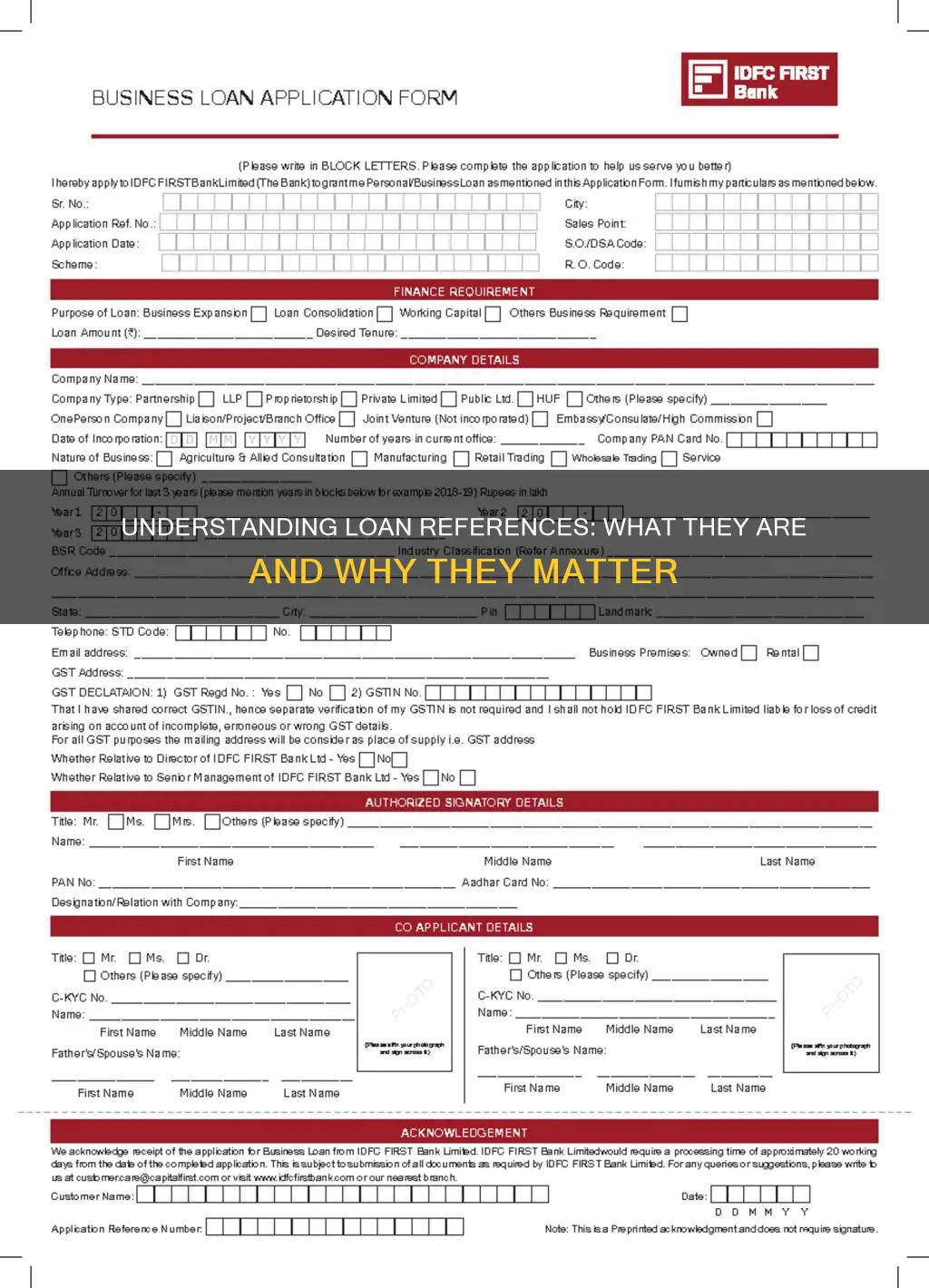
When applying for a loan, especially for the first time, lenders may ask for references to verify the borrower's information, such as their address, phone number, residence, employment, and identity. These references serve as a verification point for lenders and may be contacted to aid in finding the borrower if they become a flight risk. While not a guarantor, the reference provides a letter or completes a phone call with the lender to attest to the borrower's character and ability to pay bills on time.
| Characteristics | Values |
|---|---|
| Purpose | To verify the borrower's information, such as residence, employment, identity, and contact details. |
| Usage | Lenders use references to approve loan applications, especially for borrowers with bad credit. |
| Type of Information | References do not provide sensitive information such as income but may confirm basic details like address and phone number. |
| Impact on Reference Provider | Being a reference does not affect the provider's credit score or make them responsible for the loan. They are only responsible for answering simple questions from the lender. |
| Request Process | Lenders may ask for a letter of reference or a phone call with the reference provider to confirm the borrower's details. |
What You'll Learn

Loan references are used to verify a borrower's information
Personal references are not asked to divulge sensitive information such as income or other financial details. Instead, they are expected to answer a few simple questions, such as verifying the borrower's address, phone number, or identity. Lenders may also use references as a backup means of contacting the borrower if they cannot reach them directly.
Credit references, on the other hand, are typically provided by financial institutions, such as banks or credit card companies, and can hold more weight in the loan approval process. These references may come in the form of letters or verbal correspondence, attesting to the borrower's ability to manage finances and pay bills on time.
Loan references are an important aspect of the lending process, helping to streamline loan approvals, especially in time-sensitive situations, and providing an additional layer of security for lenders.
The Twisted Web of Incest: Me Con Loan Luan
You may want to see also

They are a security measure to prevent fraud
Loan references are a security measure to prevent fraud and ensure that funds are only released when appropriate. They are a way for lenders to quickly verify the details of a loan applicant without the lengthy process of sending documents back and forth. This is especially important in the fast-paced market of payday loans.
References are usually requested for first-time applicants. They are not a reflection of trust or a personal judgement on the applicant; they are simply a security measure. If an applicant becomes a flight risk, tries to disappear without paying their loan, or undergoes an undisclosed change in location, the lender can contact the reference to help track them down.
Loan references are also used to verify the identity, residence, and employment of the applicant. Lenders may also ask for confirmation of the applicant's address and phone number. In some cases, a reference may be asked to attest to the applicant's character and their ability to pay bills on time.
For car loans, in particular, a list of five to eight personal references may be required for applicants with bad credit. These references are not responsible for the loan and will not have their credit score affected. They are simply there to provide peace of mind for the lender and answer some basic questions.
Jumbo Loan Size: Expansion and Impact on Borrowers
You may want to see also

They are a requirement for bad credit car buyers
A loan reference is someone who knows the borrower and can confirm their identity and address. They are also a backup way for lenders to reach out to the borrower if they can't get ahold of them. While being a reference for an auto loan doesn't affect the reference in any way, they are a requirement for bad credit car buyers.
Lenders who work with higher-risk car buyers usually ask for additional items, known as "stipulations" or "stips" in the business. One of these items is often a list of references. These references serve as a verification point for lenders and may or may not be called upon for information. Lenders, specifically subprime lenders that work with bad credit borrowers, use references to verify that the borrower lives where they say they live and that they are who they say they are.
For bad credit car buyers, having a list of references ready to present to a potential lender is one of the steps to getting a loan. Dealerships that specialize in alternative auto financing look at factors outside of credit scores to determine the borrower's reliability. One of the ways they do this is by collecting a list of references. Lenders use many other things as well, such as credit score, income, employment, residence stability, and ability to provide a down payment.
The number of references required varies by lender, but generally, five to eight complete personal references are used in the financing process. These can be friends, family members, or coworkers, but they can't share the same address as the borrower. It's a good idea to prepare six to eight references, even if a lender doesn't require this many. When putting together a list of references, it's best to have a mix of professional, family, and friend contacts.
Selling a Boat with a Loan: What You Need to Know
You may want to see also

They can speed up the loan application process
Loan references are typically required for car loans, especially if the borrower has bad credit. Lenders may ask for a list of personal references to verify the borrower's identity, contact information, and other information such as workplace and salary. This helps reduce the risk of loan fraud and ensures the lender can get in touch with the borrower if they fail to make a payment.
When it comes to speeding up the loan application process, several strategies can be employed:
Automation and Digitization
Manual processes can be time-consuming and prone to errors. By leveraging technology, lenders can automate various stages of loan processing, from application submission to verification and approval. This not only speeds up the process but also reduces the risk of human errors. Automation can also help lenders make more accurate credit decisions and increase yield by booking more profitable loans.
Streamlined Workflows
Efficient workflows ensure that the loan request moves smoothly through different departments with minimal delays, contributing to faster processing times. This can be achieved by mapping out the loan process, identifying potential bottlenecks, and integrating various data sources to expedite verification and assessment.
Loan Processing Software
Loan processing software platforms provide a centralized location to upload and manage loan documents. This allows financial institutions to collect, sort, and assign information for review quickly. With all the content stored online, authorized users can access the documents from any internet-connected device, even on days when they are not in the office. This eliminates potential delays caused by misplaced documentation or missing application answers.
Data Integration
Integrating various data sources, such as traditional and alternative bureau data, can expedite the verification and assessment process. This helps lenders make faster and more informed credit decisions.
Scalability and Flexibility
The loan processing system should be designed to handle varying loan volumes without compromising speed. As the lending business grows, the system should be able to scale accordingly to maintain efficiency.
By implementing these strategies, lenders can significantly speed up the loan application process, leading to increased borrower satisfaction, loyalty, and recommendations.
VFW Loan Crutches: What You Need to Know
You may want to see also

They are not a reflection of the applicant's trustworthiness
When applying for a loan, a lender may request a list of personal references. These references are not a reflection of the applicant's trustworthiness. They are simply a verification point for lenders, who may or may not contact them for information.
Lenders use references to verify the borrower's information, such as their residence, employment, phone number, and identity. They are also used as a backup means of contacting the borrower if the lender cannot get a hold of them.
Personal references are not responsible for the loan and do not affect the applicant's credit score. They are not asked for sensitive information such as income or other personal details. Their only responsibility is to answer basic questions about the borrower if the lender reaches out to them.
References are a matter of security and a tool to prevent fraud. They ensure that funds are released only when applicable and can be recovered if the borrower's location changes. Lenders may also request references to confirm the accuracy of details provided in the application and to prove the applicant's reliability, credibility, and honesty.
Therefore, being asked to provide references is not a reflection of the applicant's trustworthiness. It is a standard part of the loan application process, particularly for first-time applicants, to ensure responsible lending and fraud prevention.
The US Department: Loan Write-Offs and Time Limits
You may want to see also
Frequently asked questions
A loan reference is a reference from a trusted source that lenders use to approve applications for loans or credit.
Lenders ask for references to prevent fraud and ensure that funds are released and can be recovered when applicable. They are also used to verify the borrower's information, such as their address, phone number, residence, employment, and identity.
A loan reference can be any personal contact of the buyer. It is usually a good idea to have a credit provider, like a bank, credit card company, utility company, or auto-loan financing firm as your credit reference provider.
A loan reference is responsible for answering basic questions asked by a lender. They are not responsible for the loan and it does not affect their credit score.







